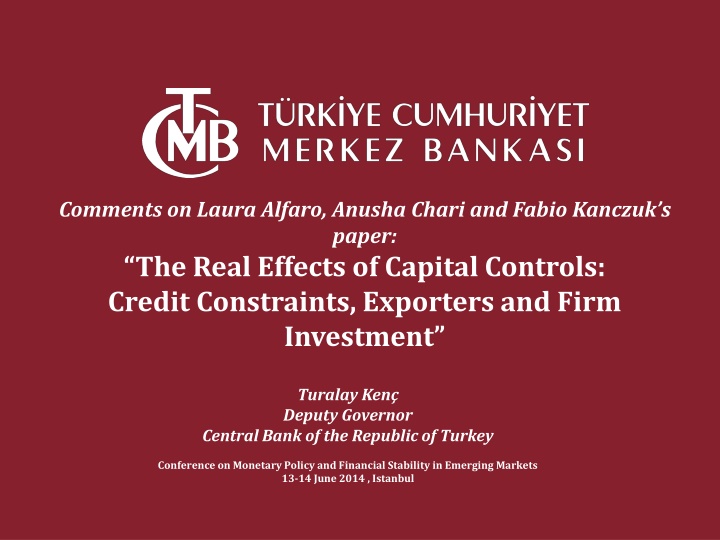
The Real Effects of Capital Controls on Emerging Markets
Explore the impacts of capital controls on capital inflows, transmission channels, and market pricing in emerging markets. Learn about the long-run effects, liquidity impacts, and macro-financial risks associated with such controls. Discover the market failure issues and models needed to address them, as well as other insightful comments on the effectiveness of capital controls.
Download Presentation

Please find below an Image/Link to download the presentation.
The content on the website is provided AS IS for your information and personal use only. It may not be sold, licensed, or shared on other websites without obtaining consent from the author. If you encounter any issues during the download, it is possible that the publisher has removed the file from their server.
You are allowed to download the files provided on this website for personal or commercial use, subject to the condition that they are used lawfully. All files are the property of their respective owners.
The content on the website is provided AS IS for your information and personal use only. It may not be sold, licensed, or shared on other websites without obtaining consent from the author.
E N D
Presentation Transcript
Comments on Laura Alfaro, Anusha Chari and Fabio Kanczuks paper: The Real Effects of Capital Controls: Credit Constraints, Exporters and Firm Investment Turalay Ken Deputy Governor Central Bank of the Republic of Turkey Conference on Monetary Policy and Financial Stability in Emerging Markets 13-14 June 2014 , Istanbul
Possible Impacts of Capital (Inflow) Controls Direct impacts Reduce the volume of capital inflows Change the composition of inflows Indirect impacts By affecting the transmission channels of capital inflows 2
Transmission channels of Capital flows Price channel i. Exchange rates ii. Interest rates II. Quantity (funding) channel i. Credit growth III.Liquidity channel IV. Risk taking channel I. 3
Impacts of EM capital controls on EMEs Long run effects I. international capital allocation II. Liquidity effects Emerging markets III. Macro-financial risk effects Leverage + currency appreciation + risk appetite 4
Market pricing of capital control effects The Efficient Market Hypothesis holds: Long run effects lower stock prices I. Liquidity effects lower stock prices II. III. Macro-financial risk effectsincrease stock prices Market Failure: There also exits a type of the market failure problem: Firms do not internalize the social cost of the macro- financial risk they cause. 5
Issues I. Models to capture macro-financial risk effects if EMH does not hold and markets fail. II. Models to differentiate liquidity effects from long-run efficiency effects 6
Other Comments Precise question, novel data, well-suited methodology Intuitive results, thorough discussions, and complement the theory on capital controls Significant contribution in terms of providing micro-level evidence on the effectiveness of capital controls 7
Summary of the Paper Major contribution: micro-level evidence on the effects of capital control on firm-level stock returns and real investment as opposed to previous macro-level evidences. Using firm level data from Brazil, identifies the channels through which capital controls can affect the economy at the micro-level. Uses debt and equity controls imposed in Brazil between 2008-2012 as main events Standard event study approach Cumulative abnormal (actual - expected) returns to evaluate the imposition of capital controls Firm-characteristics size, finance, export, etc. Results are in line with macro ones. 8
Summary of the Result Capital controls lower stock returns, increase the cost of capital for Brazilian firms with the imposition of capital controls. Firm-characteristics matters; Large firms, and (the largest) exporting firms, firms with less dependence on external finance are less affected by capital controls Capital controls lower investment at the firm-level as a result of the heightened market uncertainty and the decline in the availability of external finance. Strong liquidity effects 9
Discussion Expectation channel? Forbes et al. (2012): Much of the effect of capital controls on portfolio flows appears to occur through signaling i.e. changes in investor expectations about future policies rather than the direct cost of the controls. Alternative methodology? Synthetic control method, propensity-score Refinement of the current methodology Risk free asset: Black Model Market model or APT How to construct average cost of capital? Evidence on (abnormal) return are presents. How about risk premium? 10
Possible Extensions How to combine firm-level evidence with the macro-level data on the effectiveness of capital controls? Extant literature effectiveness of capital controls on capital flows Does micro-level evidence provide any information on how capital controls affect the systemic risk contribution of the firms following the imposition of capital controls? Systemic expected shortfall or contingent claims analysis Alternative measure and assessment of riskiness of firms? Distance to default Does current framework provide any evidence on market efficiency? 11
Possible Extensions How to combine firm-level evidence with the macroeconomic effect of imposition of capital controls? Possible impacts of capital controls on (in)flows: Reduce the volume of inflows => cash flows (-) Change their composition => cash flows (-) Affect the real exchange rate => exporters performance (+) => consistent results More independent pursuit of monetary policy =>NPV of cash flows and firm value(-). Increase/decrease financial stability => Overall effects 12
Possible Extensions How to disentangle to source of external finance? The implications for the firm performance would depend on Direct finance from domestic market Direct or indirect finance from abroad The effect of capital control would also depend on how firm is leveraged is initially 13
Comments on Laura Alfaro, Anusha Chari and Fabio Kanczuks paper: The Real Effects of Capital Controls: Credit Constraints, Exporters and Firm Investment Turalay Ken Deputy Governor Central Bank of the Republic of Turkey Conference on Monetary Policy and Financial Stability in Emerging Markets 13-14 June 2014 , Istanbul
